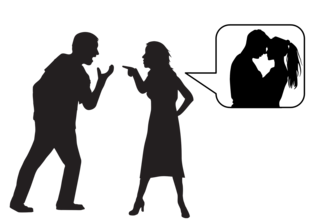Relationships
Contempt: The Biggest Relationship Threat
And how to avoid it.
Posted April 27, 2020 Reviewed by Jessica Schrader

Linda: The esteemed relationship expert John Gottman uses the term "Four Horsemen of the Apocalypse" to refer to four of the biggest threats to relationships. They are criticism, defensiveness, stonewalling, and contempt.
If you guessed contempt as the most threatening of the four, congratulations, you’re right. If you’re unclear about the definition of contempt or unsure of how it differs from anger or resentment, here’s how the dictionary defines it:
Contempt: a feeling towards another that they are unworthy of any degree of respect and deserving only of scorn and condemnation; beneath all consideration.
That’s strong language, particularly when used about someone with whom we are likely to have previously felt feelings of appreciation and love. Yet it is possible to go from valuing another to despising them, sometimes within a surprisingly short period of time.
Contempt rarely comes “out of the blue,” although it may seem that way to the person experiencing it or to the one who is the recipient of it. It occurs as a result of denied or undealt with disappointment, resentment, anger, or hurt.
The circumstances that cause us to experience unpleasant feelings towards someone don’t disappear. In fact, they become intensified until they are addressed in a way that neutralizes their cause.
Clearing the strong feelings can sometimes occur without involving the other person’s participation in the healing process (by forgiving them). But more often than not, we need to have “the talk." Bringing an incompletion to another person can feel risky since we are opening the possibility that they may become angry and hurt since we are the bearer of difficult news.
Rather than speak up, we instead withhold our feelings, hoping they will go away and that we won’t have to say anything. But these negative feelings erode the foundation of the relationship, deepening mistrust, resentment, anxiety, disappointment, and distance. Moving into the territory of contempt is like going from being unhappy to being profoundly depressed. It’s difficult to recover due to the powerfully entrenched grip that it has on us.
The longer unacknowledged issues remain unattended to, the more likely it becomes that they will create a polarizing impasse. One or both partners sees no solution other than leave or continue to try to tolerate a loveless partnership. Trying to tolerate a situation where one is held in contempt is unsustainable and will cause grave damage to our body, heart, and/or soul.
Contempt doesn’t come out of nowhere. It is a result of an unwillingness to initiate difficult conversations, or when one’s partner has failed to hear one’s honesty when it is motivated by a commitment to the well-being of the relationship. When a partner responds to painful feedback without becoming hostile, contempt is unlikely to occur because there will be little fear of retaliation for bringing up the tough issues.
The tendency towards contempt is a habit that has been co-created by both partners. If a partner is conflict-avoidant and inclined to deal with their feelings by nursing anger, grudges, and destructive fantasies, over time if unchecked, this pattern can destroy even a good relationship.
The keyword here is “unchecked." When we pay closer attention to our relationship’s needs and respond to them in a timely manner, the deterioration into contempt becomes a much lower possibility. When we check out of our relationship, we are sowing the seeds of contempt and putting the relationship itself at risk.
Admittedly, it can take courage and commitment to hold ourselves as being deserving of respect and consideration. Doing so can provoke someone who has used bullying to intimidate others. The good news is that when we begin to stand up for ourselves and refuse to be treated disrespectfully, we not only diminish contempt, but we take powerful steps in restoring self-respect to our personal and public identity. Sometimes we have to be willing to risk our relationship with another to earn the right to feel good about ourselves. Are you?
We’re giving away three e-books absolutely free of charge; get them here. You’ll also receive our monthly newsletter.




